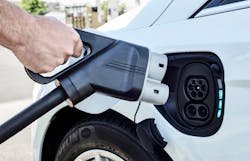Duke Energy and Auto Makers Team Up to Launch EV Charging Program
Duke Energy, General Motors, Ford Motor Company, and BMW of North America have partnered to launch a new 12-month electric vehicle (EV) home charging program in North Carolina to help bring certainty to EV charging costs. The pilot program will allow residential customers in the state with a qualifying EV to use up to 800 kWh per month to charge their vehicle at home for a fixed monthly fee.
“North Carolina has ambitious goals to reduce greenhouse gas emissions, and we’re supporting those efforts,” said Kendal Bowman, Duke Energy North Carolina State President. “Increasing the numbers of EVs while reducing the number of gas-powered vehicles on the road will help our state move closer to carbon neutrality.”
Duke Energy and its vehicle manufacturing partners are working together as a part of the Open Vehicle Grid Integration Platform (OVGIP), which enables the management of EV charging from multiple automakers in a grid-friendly and EV driver-centric manner. OVGIP data will allow Duke Energy to measure customer charging data directly from the enrolled vehicles, eliminating the need to install a second meter.
Fleet Electrification and Grid Challenges will part of T&D World Live Content
T&D World Live: Happening Sept. 12-14 in Sacramento
A Show for Utilities by Utilities: Register here
The pilot will comprise of program participants adding their desired time to reach a certain state of charge, and respective automakers optimizing their EV charging schedule to avoid charging during the grid’s peak hours while contributing to grid stability.
“The average EV owner is already saving about $1,000 per year on fuel costs compared to a traditional vehicle – a predictable monthly subscription charge on top of that is going to ensure predictable savings when charging,” said Bowman. “Beyond cost savings, EV charging at home tends to be convenient because drivers can leave the house with a fully charged vehicle and lessen the number of trips to public charging stations.”
Under the pilot, Duke Energy will call up to three demand response events per month to help balance grid demand. Automakers will communicate the demand response notifications to pilot participants at least 12 hours before the event and include the date and hours to avoid charging their EV. During the pilot, participants can opt out of demand response events four times.
“Duke Energy has been strategically planning and enabling the grid for a future with many more EVs on the road – and is also making data-driven investments to improve reliability, strengthen the grid, expand technologies, and provide customers with the intelligent information they need to make smart energy choices and save money,” said Harry Sideris, executive vice president of customer experience at Duke Energy.
Find Out More about the C&I Energy Transition: Subscribe to our free EnergyTech Newsletter
